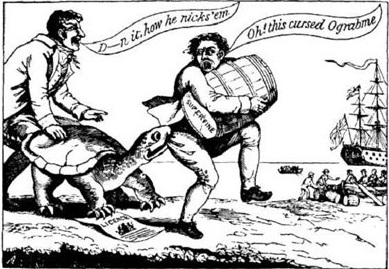Meanwhile, relations with Great Britain worsened over the growing American commerce with France and her colonies. By 1807, the French Revolution had collapsed in a coup that elevated a military genius and despot, Napoleon Bonaparte, who created an empire from the ruins of the French republic.

Rather than make peace with the British, Napoleon escalated the war, conquering most of Europe. To undermine the French economy, the British sought to enforce a strict blockade on foreign commerce, to the detriment of American merchant ships, for British naval captains profited by confiscating any neutral ships en route to or from trading with the French and their allies.
The British also desperately needed more sailors to man the vast Royal Navy required to blockade Europe and to control the shipping lanes of the world. To get those sailors, British naval officers stopped neutral merchant ships to “impress” into their service any men who seemed to be British by birth. Often those impressed sailors had left the British Isles to seek the higher pay and better conditions of American merchant ships. Sometimes, however, the naval officers seized Americans by birth. In that first generation after the revolution, it was often difficult to distinguish Americans from Britons—and naval captains did not care to try when they had pressing vacancies in their ships.
Although offended by the British seizures of ships and impressment of sailors, President Jefferson and his secretary of state, James Madison, balked at declaring war, for they feared the high costs and heavy taxes of building up the military. After all, they had risen to national power by exploiting the unpopularity of the Federalist taxes to fund a bigger army and navy.
Rather than build more warships, the Republicans waged a commercial war by suspending all American trade with the world in an “embargo” that began in December 1807. By locking down all American ships in their ports, the Republicans sought to pressure the British into relinquishing impressment and the strict blockade. Jefferson and Madison reasoned that the British economy would collapse without food imported from America and without access to the American market for British manufacturers. In fact, the British found alternative markets in Latin America. Indeed, the embargo inflicted greater damage on the American economy. In turn, that pain revived the Federalist party in the northeast, the region that most relied on overseas commerce. The dismayed Republicans lifted the embargo in March 1809, just as Jefferson retired and Madison became president.
Part of a series of articles titled From the American Revolution to the War of 1812 .
Last updated: March 10, 2015
